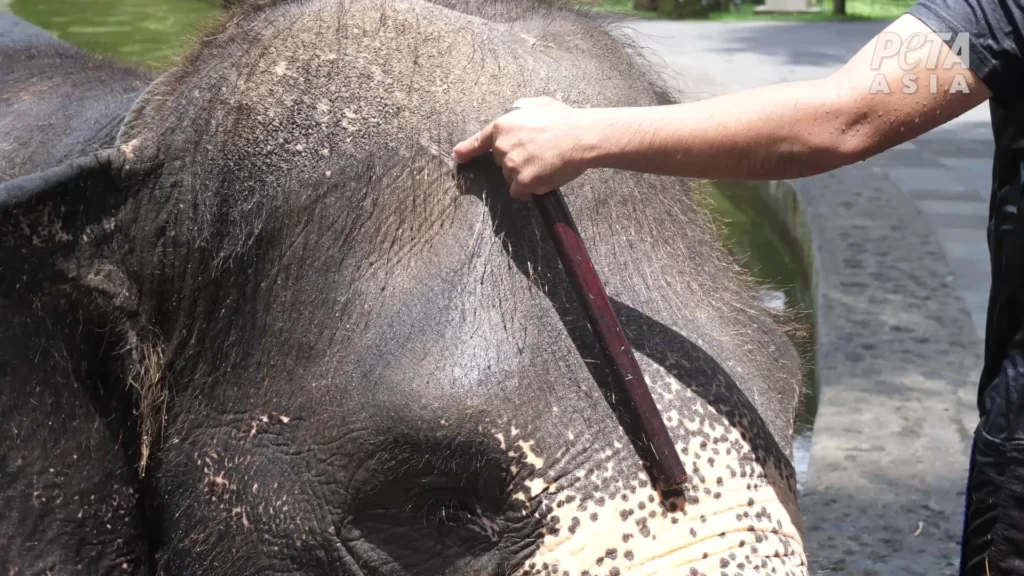At Sustainable Action Now, we believe that true sustainability extends beyond protecting the planet—it includes defending the lives and dignity of the animals who share it with us. Around the world, wildlife is often exploited under the guise of conservation or “education,” and few examples are as heartbreaking as what’s happening to elephants in Bali.
What many tourists believe to be “ethical” elephant encounters—gentle rides, bathing experiences, or up-close photo opportunities—are in truth a dark and cruel industry built on suffering. Behind the carefully crafted marketing of “sanctuaries” and “eco-tourism” lies a hidden world of confinement, domination, and physical and psychological torment for these majestic animals.
The Hidden Cruelty Behind the Façade
The tourism industry in Bali has capitalized on travelers’ love for elephants, repackaging exploitative attractions as “ethical experiences.” Many parks claim that their elephants were “rescued” or that interactions are “educational,” but these terms are misleading. The grim reality is that most of these elephants endure a lifetime of control and deprivation.
To make these wild animals submissive enough to interact safely with humans, they are subjected to a process known as “the crush”—a brutal training method designed to break their spirit. Calves are taken from their mothers at a young age, tied down, and beaten into submission using bullhooks, chains, and intimidation. This is not conservation—it is cruelty disguised as care.
Even after the initial training, the abuse doesn’t end. Elephants in Bali’s so-called “ethical” attractions often spend their lives in small enclosures, chained when not performing, deprived of social interaction and natural behaviors such as foraging, roaming, and bathing in rivers. Despite the lush surroundings that attract tourists, these animals live under constant control, their freedom traded for photo opportunities and profits.
PETA’s Call to Action—and Why It Matters
Organizations like PETA have been vocal about exposing the truth behind these so-called sanctuaries, urging travelers to reject these exploitative businesses. Their investigations have uncovered elephants with open wounds, visible signs of distress, and behaviors consistent with severe psychological trauma—such as swaying, head-bobbing, and pacing.
By continuing to support these attractions, even unintentionally, tourists are contributing to a cycle of exploitation that traps elephants in misery for the sake of entertainment. PETA’s campaign urges travelers to choose real sanctuaries—facilities where elephants live freely without being forced to interact with humans or perform.
Supporting True Elephant Conservation
Real ethical tourism is about respect, not exploitation. True sanctuaries and conservation programs prioritize the well-being of elephants over human entertainment. They provide vast, natural environments where elephants can roam freely, form herds, and live according to their instincts.
At Sustainable Action Now, we stand with global advocacy efforts to end the abuse of elephants in captivity. Through our Elephants Initiative, we promote education, awareness, and direct action to protect these incredible creatures from cruelty. We encourage travelers to research before they visit, ensuring their choices support authentic rescue and rehabilitation programs rather than deceptive tourist operations.
How You Can Help
Change begins with awareness—and with each traveler who chooses compassion over convenience. You can help by:
- Refusing to participate in elephant rides, bathing experiences, or other hands-on encounters.
- Supporting genuine sanctuaries that operate transparently and prioritize animal welfare over profit.
- Sharing information about the reality of these tourist attractions with friends, family, and social networks.
- Donating or volunteering through trusted programs like our Elephants Initiative to help fund real conservation work.
Every small step makes a difference. By refusing to support the cruel cycle of exploitation, we collectively send a powerful message that abuse masked as “entertainment” will no longer be tolerated.
The Path Forward
Elephants are intelligent, emotional, and deeply social animals. They deserve to live freely, not as props for human amusement. The images of chained elephants forced to give rides or perform tricks in Bali’s “ethical” parks stand in stark contrast to the myth of paradise that the island promotes. The truth is painful, but awareness is the first step toward meaningful change.
When we look beyond the glossy advertisements and tourist brochures, we find an industry built on suffering—but also an opportunity for transformation. By promoting responsible, cruelty-free tourism and supporting conservation initiatives that truly protect wildlife, we can help shift the demand away from abuse and toward sustainability rooted in empathy and respect.
The next time you plan your travels, remember: real ethical tourism doesn’t come at the expense of another life. The future of these magnificent animals depends on our choices today.
To learn more about how you can be part of the global movement to protect elephants and support genuine conservation, visit the Sustainable Action Now Elephants Initiative. Together, we can expose cruelty, empower change, and ensure that elephants in Bali—and around the world—are finally free to live the lives they deserve.


